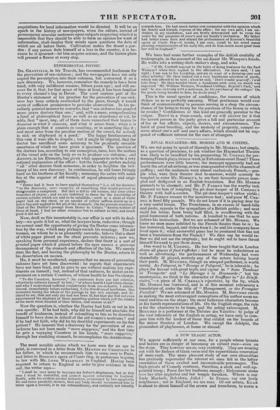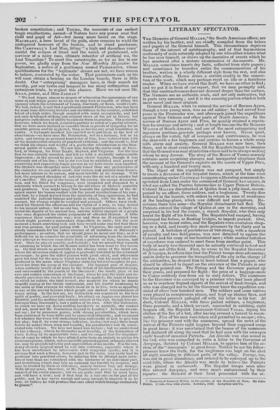A NEW TRAGIC . ACTOR.
WE appear sufficiently at our ease, for a people whose tyrants and heroes are in danger of becoming an extinct race—even on the stage. They however are so, very evidently. 'I hey are wearing out with the fashion of blank verse and the superstitious veneration of mere rank. The more pleasant study of our own absurdities has gradually superseded the interest we once felt in the loftier enormities of those exalted and inconceivable personages. The high-priests of Comedy continue, therefore, a sleek and well-ap- pointed troop ; Farce has her buffoons enough ; Melpomene alone sees her rites neglected and her temple forsaken. Where is our Lady Macbeth, Belvidere, Juliet ? In France, say our lively neighbours ; not in England, we are sure. Of our actors, KEAN is about to divest himself of the crown and truncheon, to nurse a broken constitution ; and YOUNG, the associate of our earliest tragic recollections, cannot—if Nature have any power over that child and pupil of Art—fret many more hours on the stage. MACREADY, a hero loved of the gods, alone remains to wield the undisputed honours of the buskin, and to stand perchance, -like CAMPBELL'S Last Man, lifting " a high and dauntless voice" amidst the eclipse of tinsel and the wreck of pasteboard, sole survivor of a noisy race, ultimate inheritor of artificial wo, the Last Tragedian ! To avert this catastrophe, as far as lies in our power, we gladly copy from the New Monthly Magazine for September, a notice of a gentleman named PEMBERTON, whose qualifications for the " legitimate" drama are not, we have reason to believe, overstated by the writer. That pretensions such as his will soon obtain a hearing on the London boards, there is little doubt. Our " enterprising" managers have, in their search for novelty, put our tastes and tempers to too many unforgotten and unforgiven trials, to neglect this chance. Have we not seen Mr. KEAN, junior, and Miss JARMAN ?
" We had begun almost to despair of witnessing the appearance of any actor of real tragic power to whom we may look as capable of filling the vacancy which the retirement of Young, Macready, or Kean, would create. We had, indeed, heard that a gentleman named Pemberton, who has been for some time delivering lectures and recitations in the country, exhibited talent of a high order, though mingled with some eccentricity, and had not only developed striking and original views of his art in theory, but had given indications of ability to embody them in practice. The accounts, however, which we heard, seemed to partake so much of a partial interest, that we were more inclined to consider them as proofs of sympathy for an amiable person unduly neglected, than as having any great foundation in reality. A fortunate accident has enabled us to put them to the test of observation—we have seen Mr. Pemberton, not as a lecturer, but as an actor, and having no personal knowledge of him, have watched him with all the disinterested severity of practised criticism ; and the result is, that we think his claims well worthy of a particular introduction to the thea- atrical public of London. We saw him during the assize week at Here- ford, in Hotspur, Sir Peter Teazle, Shylock, and Virginius. For the two first he was entirely unsuited, and left us with a decidedly unfavourable impression ; in the second he gave some clever touches, though it was obviously out of his line ; but in the two last he exhibited such power of conceiving and expressing tragic passion as we have rarely seen equalled. His Shylock was altogether more deeply toned than any performance of the character we can call to mind ; less various and pointed than Kean's, but more intense in its sorrow, and more terrible in its revenge. With him, the purposed slaughter of Antonio wore the air not of a murder but of a sacrifice. His joy at the losses of his enemy, his savage determina- tion, and his thirst for vengeance, were tempered and deepened by a solemnity which seemed to belong to the old times of Hebrew austerity and greatness. You might fancy that beneath the gaberdine of the de- spised usurer his bosom swelled with the proud recollections of his race ; and that, by a fraud derived from the necessity of long oppression, he had snatched the judicial balance and knife in which, with the flesh of the scorner, his wrongs might be weighed and avenged. Others have vindi- cated for Shylock the affections and the rights of a man, so long denied to his injured nation ; but no one has, to our apprehensions, so finely as- serted the dignity of his ancient line, and the fearful energies of a people who once dispensed the visible judgments of offended Heaven. A little coarseness there sometimes was ; now and then an ill-regulated tone which might provoke a momentary disposition to smile ; but the next moment a heart-searching look and tone would make one feel that there was true passion, far past jesting with. In Virginias, the early part was chiefly remarkable for the entire absence of all imitation of Macready's performance ; so entire, that we should guess he never saw him ; as it is difficult for us to conceive the possibility of refraining from the involun- tary attempt to borrow some traits from a picture so rich, various, and true. Here he played sensibly and feelingly ; but we missed that warmth of colouring in which the old Roman father has been wont to live before us. He first struck us powerfully in the closing scene of the third act, where the atrocious claim of Appius is gradually unfolded by the reluctant messenger ; he gave the stifled passion with great effect, and afterwards grew too loud for the area in which we saw him ; but his main effect was produced in the scene where Virginias stabs his beloved daughter to pre- serve her from the grasp of the ravisher. His haggard gaze of despair, when suddenly bereft of all hope by the defeat of his fainthearted friends, and surrounded by the guards of the Decemvir ; the deadly glare of his eyes and sudden convulsion of his frame, when he sees the knife and in- stantly perceives the use to which it must be applied; the maze of horror in which he inflicts the fatal wound ; the moment for which he stands stupidly gazing at the bloody instrument, and his fearful awakening to the sense of that revenge for which alone he is to live, were as appalling as any of the mortal horrors which people our darkest remembrances of tragic acting. In the last act, his distraction was conceived in the true spirit of poetry, and executed finely ; his attack on Appius was almost too frightful, and his melting into natural sorrow at the end, though less pic- turesque than Macready's, had a pathos of its own. After this statement, in which we have set down nothing heedlessly or partially, our readers will ask, must not Mr. Pemberton succeed in London ? In truth we can- not say ; for he possesses genius, with strong peculiarities, which have been confirmed by long habit and by unmerited obscurity; and we cannot tell whether the town will understand him sufficiently at first to give him fair play; but if, by some strange inflexion, he does not make them laugh before he makes them weep and tremble, his peculiarities will be conse- crated into virtues. We have not heard him lecture ; but we understand he has a theory, which he illustrates most forcibly, of the delineation of every feeling by its appropriate tone ; and we suspect that the singulari- ties of voice to which we have alluded arise from an anxiety to realize his own conceptions, which, unless carefully guarded against, orlargel y allowed for, may be prejudicial to the just appreciation of his merits. It is the ten- dency of every original mind to run into extremes, especially where it has been unsoftened by intercourse with congenial spirits ; and it is obvious that such a theory, however just in the main, may easily lead its professor into practical errors, by inducing him to attempt more varie- ties of tone than are consistent with the harmony of an individual part, and transitions which may take an audience too harshly by surprise, and may be treated by them as ridiculous, merely because they are strange. With all our sense, therefore, of Mr. Pemberton's power, we cannot feel assured of his entire success ; but we are quite sure that he must have, and will have a trial ; and if that trial be a fair one on the part of the public, and he has nerve enough and sense enough to improve it as he may, we believe he will produce that rare effect which belongs exclusively to genius.",



















 Previous page
Previous page